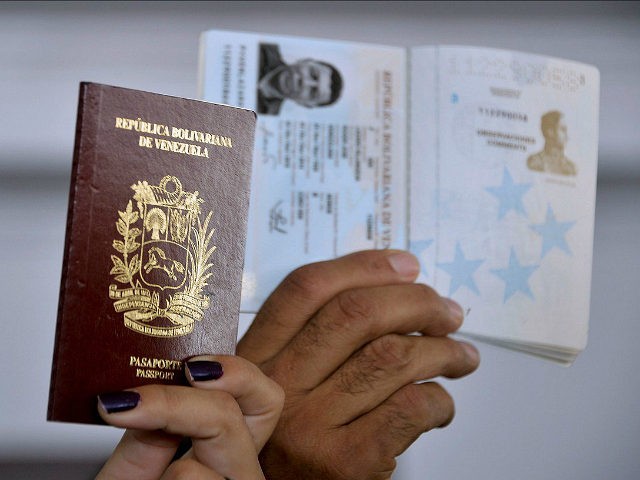The socialist government of Venezuela is reportedly struggling to meet the demands of its citizenry in obtaining passports, both to flee the country and to replace their expired passports abroad.
The demand has led some officials to demand bribes in order to expedite the process, despite the debut of a new online system the government promised would issue passports with a 72-hour turnaround time.
Venezuelans are objecting that denying them their passports is a violation of their right to travel and suspect that dictator Nicolás Maduro may be attempting to limit the growth of the exile community abroad, especially those whose legal status in a host country may be negatively affected if their passports expire and the government does not issue them a replacement.
Venezuela has been accused of acquiring an advanced passport printing mechanism intended to prevent the creation of counterfeit documents with help from the communist government of Cuba, then using the system to create genuine Venezuelan government documents for non-Venezuelan citizens affiliated with Shiite terrorist organizations, including Hezbollah.
A Fox News report noted Thursday that the government has told the hundreds a day who line up outside the Identification Administration, Migration, and Foreign Affairs Service (Saime) offices seeking passports that the agency no longer has the physical materials necessary to print the number of passports citizens are demanding. Fox News estimates the number of passports requested in 2016 to be between 1.8 million and three million and the post-Chávez Venezuelan diaspora to consist of nearly two million people. Venezuela issued 300,000 passports last year.
A former Venezuelan government security official told Miami’s El Nuevo Herald last month that part of the problem was the government’s inability to import the materials necessary to make the passports or fix their incapacitated printers. “Of the eleven machines the government bought to print passports, only two are functioning,” Anthony Daquín told the publication. “The rest have been cannibalized because there is no money for maintenance.”
Daquín told the Herald that the scarcity has led some officials to sell passports illegally for bribes of up to $500. The monthly minimum wage in Venezuela, for comparison, is about $13.50.
Others have accused the Venezuelan government of demanding even more money. Ángelo De Dominicis, a Venezuelan engineer in Chile, told the NGO Transparencia Venezuela that an official asked for $1,650 to procure a passport, far more than the standard embassy price of $80. NGO president Mercedes De Freitas told news outlets she had also heard of Venezuelan officials asking nationals in Puerto Rico for $1400 to renew a passport. De Freitas is preparing to accuse Venezuela of corruption in issuing passports before the Interamerican Human Rights Commission. “The increase in corruption and extortion due to these shortages is incredible,” she lamented.
Saime has responded to these shortages by announcing a new procedure for renewing the documents online. The process would reportedly take 72 hours and cost 67,800 bolivars ($21). Venezuelans have protested, however, that the website for the program has been down for extended periods of time, making the system impossible to use. The Venezuelan newspaper El Nacional estimates that the inability to renew passports could be affecting as many as 60,000 families in Florida alone.
During the tenure of late dictator Hugo Chávez, the socialist Venezuelan government invested heavily in restoring its passport printing system. According to documents revealed as part of the dump known as the “Panama Papers” – documents from the international law firm Mossack Fonseca – the Cuban government paid for the new passport system, with the law firm working within corporate structures to allow for the purchase of passport printing technology from a German company.
Long before the Panama Papers revelations, reports had begun to surface that the Venezuelan government was creating genuine government documents in the names of individuals who were not Venezuelan citizens but willing to pay thousands of dollars for Latin American passports. These passports allow for easier access to much of the Western hemisphere than Middle Eastern passports.
According to Misael López Soto, a former official at the Venezuelan embassy in Baghdad, Venezuela sold birth certificates, passports, and other identifying documents to Syrian, Lebanese, Iraqi, and other nationals, many of whom were individuals López believed had ties to Hezbollah.
López told CNN last month that the average price a Middle Eastern national paid Venezuela for these documents was between $10,000 and $15,000.

COMMENTS
Please let us know if you're having issues with commenting.